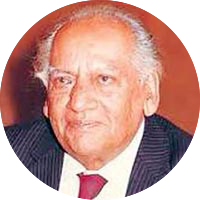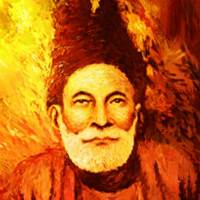mauzu-e-suKHan
gul huī jaatī hai afsurda sulagtī huī shaam
Dhul ke niklegī abhī chashma-e-mahtāb se raat
aur mushtāq nigāhoñ kī sunī jā.egī
aur un hāthoñ se mas hoñge ye tarse hue haat
un kā āñchal hai ki ruḳhsār ki pairāhan hai
kuchh to hai jis se huī jaatī hai chilman rañgīñ
jaane us zulf kī mauhūm ghanī chhāñv meñ
TimTimātā hai vo āveza abhī tak ki nahīñ
aaj phir husn-e-dil-ārā kī vahī dhaj hogī
vahī ḳhvābīda sī āñkheñ vahī kājal kī lakīr
rañg-e-rukHsār pe halkā sā vo ġhāze kā ġhubār
sandalī haath pe dhuñdlī sī hinā kī tahrīr
apne afkār kī ash.ār kī duniyā hai yahī
jān-e-mazmūñ hai yahī shāhid-e-ma.anī hai yahī
aaj tak surḳh o siyah sadiyoñ ke saa.e ke tale
aadam o havvā kī aulād pe kyā guzrī hai?
maut aur ziist kī rozāna saf-ārā.ī meñ
ham pe kyā guzregī ajdād pe kyā guzrī hai?
in damakte hue shahroñ kī farāvāñ maḳhlūq
kyuuñ faqat marne kī hasrat meñ jiyā kartī hai
ye hasīñ khet phaTā paḌtā hai jauban jin kaa!
kis liye in meñ faqat bhuuk ugā kartī hai
ye har ik samt pur-asrār kaḌī dīvāreñ
jal-bujhe jin meñ hazāroñ kī javānī ke charāġh
ye har ik gaam pe un ḳhvāboñ kī maqtal-gāheñ
jin ke partav se charāġhāñ haiñ hazāroñ ke dimāġh
ye bhī haiñ aise ka.ī aur bhī mazmūñ hoñge
lekin us shoḳh ke āhista se khulte hue hoñT
haa.e us jism ke kambaḳht dil-āvez ḳhutūt
aap hī kahiye kahīñ aise bhī afsūñ hoñge
apnā mauzu-e-suḳhan un ke sivā aur nahīñ
tab.a-e-shā.er kā vatan un ke sivā aur nahīñ
Poetry’s Theme
The evening flickers, glows and falters to a halt.
The night will come, washed clean with moonlight.
And we shall speak again with gestures of our eyes,
And those hands will clasp these yearning hands of mine.
Is it her scarf, her face, her dress
That makes the veil so bright, so clear?
Does that earning glitter still
in the ambiguous dark shade of her hair?
Once again, her beauty will adorn the night:
those dreamy eyes, those lines of black,
that subtle hint of power on her cheek,
that delicate line of henna on her palm.
This, if any, is my world of thought, my poetry;
this the soul of context, the heart of meaning.
What have Adam’s luckless children suffered?
in our cruel and bloody centuries?
What have our forefathers suffered?
What shall we suffer,
in the daily battle of life and death?
Why do these youthful and glamorous cities
live in the hope of merely dying?
Why does only hunger grow
in fields where harvests are blooming?
These mysterious frightening walls
within which so many lives have been snuffed out
each instant; these tortured dreams
whose glow still haunts the minds of millions.
These too are subjects of poetry
And there are many, many more.
But still-
those gently parting lips.
Those wicked curves!
Tell me, friend:
is there a more alluring subject anywhere?
The subject of my verses is none else;
the home for a poet’s heart is nowhere else!
gul hui jati hai afsurda sulagti hui sham
Dhul ke niklegi abhi chashma-e-mahtab se raat
aur mushtaq nigahon ki suni jaegi
aur un hathon se mas honge ye tarse hue hat
un ka aanchal hai ki ruKHsar ki pairahan hai
kuchh to hai jis se hui jati hai chilman rangin
jaane us zulf ki mauhum ghani chhanw mein
TimTimata hai wo aaweza abhi tak ki nahin
aaj phir husn-e-dil-ara ki wahi dhaj hogi
wahi KHwabida si aankhen wahi kajal ki lakir
rang-e-rukHsar pe halka sa wo ghaze ka ghubar
sandali hath pe dhundli si hina ki tahrir
apne afkar ki ashaar ki duniya hai yahi
jaan-e-mazmun hai yahi shahid-e-mani hai yahi
aaj tak surKH o siyah sadiyon ke sae ke tale
aadam o hawwa ki aulad pe kya guzri hai?
maut aur zist ki rozana saf-arai mein
hum pe kya guzregi ajdad pe kya guzri hai?
in damakte hue shahron ki farawan maKHluq
kyun faqat marne ki hasrat mein jiya karti hai
ye hasin khet phaTa paDta hai jauban jin ka!
kis liye in mein faqat bhuk uga karti hai
ye har ek samt pur-asrar kaDi diwaren
jal-bujhe jin mein hazaron ki jawani ke charagh
ye har ek gam pe un KHwabon ki maqtal-gahen
jin ke partaw se charaghan hain hazaron ke dimagh
ye bhi hain aise kai aur bhi mazmun honge
lekin us shoKH ke aahista se khulte hue honT
hae us jism ke kambaKHt dil-awez KHutut
aap hi kahiye kahin aise bhi afsun honge
apna mauzu-e-suKHan un ke siwa aur nahin
taba-e-shaer ka watan un ke siwa aur nahin
Poetry’s Theme
The evening flickers, glows and falters to a halt.
The night will come, washed clean with moonlight.
And we shall speak again with gestures of our eyes,
And those hands will clasp these yearning hands of mine.
Is it her scarf, her face, her dress
That makes the veil so bright, so clear?
Does that earning glitter still
in the ambiguous dark shade of her hair?
Once again, her beauty will adorn the night:
those dreamy eyes, those lines of black,
that subtle hint of power on her cheek,
that delicate line of henna on her palm.
This, if any, is my world of thought, my poetry;
this the soul of context, the heart of meaning.
What have Adam’s luckless children suffered?
in our cruel and bloody centuries?
What have our forefathers suffered?
What shall we suffer,
in the daily battle of life and death?
Why do these youthful and glamorous cities
live in the hope of merely dying?
Why does only hunger grow
in fields where harvests are blooming?
These mysterious frightening walls
within which so many lives have been snuffed out
each instant; these tortured dreams
whose glow still haunts the minds of millions.
These too are subjects of poetry
And there are many, many more.
But still-
those gently parting lips.
Those wicked curves!
Tell me, friend:
is there a more alluring subject anywhere?
The subject of my verses is none else;
the home for a poet’s heart is nowhere else!
- Book : Nuskha Hai Wafa (Pg. 89)
- Book : Gulon Mein Rang Bhare
- Publication : Rekhta Publications
Additional information available
Click on the INTERESTING button to view additional information associated with this sher.
About this sher
rare Unpublished content
This ghazal contains ashaar not published in the public domain. These are marked by a red line on the left.





